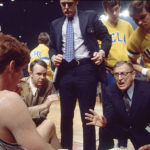Jamie Moyer was in his third year as
a major league pitcher and was, by
his own admission, still wide-eyed,
watching everything going on around
him and soaking it in. He paid particular
attention to older teammates on
his Chicago Cubs squad, hoping to
emulate habits that had allowed those
veterans to extend their careers.
Very early that season, he noticed his
newest teammate, journeyman infielder
Vance Law, made a beeline to the dugout
after every at-bat, and grabbed a pencil and
notepad. Law, who was then in the eighth
year of an 11-year career, explained to Moyer
that he made notes about each pitch he had
just seen, the sequence in which it had been
thrown and anything else he noticed that
might give him a hint of what the pitcher
might next be throwing. The attention to
every detail allowed Law to prepare for his
next plate appearance as well as the next time
he faced that pitcher.
A light went on for Moyer. He decided then
to track the habits of every batter he would
face for the rest of his career. That was 20
years ago.
“I knew then that taking notes and preparing
better for every batter in every game would be
important,” says Moyer, now with the World
Champion Philadelphia Phillies. “If you told
me then that I’d still be taking notes and
pitching in 2009, I’d have thought you were a
little nuts.”
But as the 2009 baseball season heads
toward the All-Star break, 46-year-old Moyer
is the oldest active player in Major League
Baseball. Last season, Moyer became the
second-oldest pitcher in the history of baseball to record 16 wins.
Asked the secret to his longevity, Moyer credits good health,
great teammates, constant off-season workouts… and boxes
of notebooks.
Moyer’s lengthy career has had other benefits, too. He has used
baseball as a platform to do good for others. A
father of seven, Moyer and wife Karen are
among the most charitable couples in baseball,
creating a foundation with a goal of
positively impacting every community he
has played in over his 23-year MLB career.
“I
think all the other aspects of family
and the foundation have helped keep
baseball in perspective.”
Moyer believes his life off the field also
has contributed to longevity in the game. “I
think all the other aspects of family and the
foundation have helped keep baseball in perspective,”
he says.
Make no mistake, though, about his love of the game. “I still have
that fi re,” says the left-hander.
Peer into Moyer’s pale-green eyes, and you can see the competitor.
But look back into those eyes and ask Moyer about Erin Metcalf, and
you’ll see straight into the heart of Moyer the philanthropist. Erin
was a 15-year-old cancer patient selected in 1998 by the Make-A-Wish
Foundation to visit her favorite team, the Seattle Mariners,
during spring training. Moyer, at the time a Mariners pitcher and
a Seattle fan favorite, was asked to go to dinner with Erin and
her parents.
Erin’s mother, Michele Metcalf, remembers that meeting: “Jamie
and Karen had just had their fourth baby, Duffy, who was 6 months
old at the time. And they brought Duffy to the dinner. Erin was just
thrilled beyond belief. She got to hold the baby, and she loved children.
Erin was over the moon. Not only did she get the opportunity
to meet these players and have wonderful conversations where they
showed interest in her and her family, but then the Moyers let her
interact with the baby. It was a dream evening. And, at the end of
the night, Karen asked for our contact information and said they
were going to stay in touch. I was just so taken by the way she and
Jamie extended themselves, but I fully anticipated that it would be
a meet-and-greet—an obligation to do the Make-A-Wish thing and
that would be the end.”
Instead, it was just the beginning. The Moyers made several visits to
Erin’s home over the next two years, encouraging her and her family.
And when Erin finally passed away in 2000, the Moyers decided to
direct the efforts of their foundation toward building a network of
camps aimed at helping bereaved families work through their loss.
“We had been involved with a bereavement camp in
Indiana earlier in Jamie’s career,” Karen Moyer says. “For
us, it was after my grandfather died. We were able to
endow that camp, and then, when we moved to Seattle,
we thought what a great thing to do. Let’s get involved in
bereavement in Seattle, but we went there and nobody
knew what it was.”
With the support of the Metcalfs, Jamie and Karen
created Camp Erin just outside Seattle. The camp
became a place where children who had lost a sibling,
parent or loved one could receive counseling in an environment
shared with others who had also suffered a loss.
The counseling is integrated into traditional camp activities,
such as swimming, fishing and art.
From the single camp outside Seattle, The Moyer
Foundation has now funded 27 more Camp Erins in cities
around the country. The goal, Jamie Moyer says, is to have
one in every city where a Major League Baseball team
plays. “We want to take full advantage of the platform
baseball has given us,” Moyer explains. “We want this to
be a national network that will make a difference.”
Karen Moyer says she’s still
amazed by the transformation
children make while at
the camp. “In that short time
together, we can normalize
their experience and put
them with kids with similar
experiences and put them
with counselors who can
help them and say, ‘You know
everything you’re feeling is
exactly what you should be
feeling, and this is a safe place
to talk about it,’ ” she says.
“What I love about Camp Erin
is you always feel Erin’s presence.…
You just know she’s
there and just blessing these
children, and there’s nothing
more powerful than that.”
As Jamie Moyer starts
describing one of his first visits to a camp, his eyes become moist.
“I was just coming in for a quick visit because I had to get back to
work,” Moyer recalls. “We got there and it was lunchtime. The kids
were all eating in the cafeteria, and there was a big corkboard filled
with pictures. Those were
the pictures of all the family
members who’ve been lost.
This little boy came up and
grabbed my hand and said,
‘I want to introduce you to
somebody. I want you to
meet my uncle.’ We went
over to the board and he
pointed to a picture, and
he talked about his uncle.
He said, ‘My uncle took me
to my first Major League
Baseball game.’ That was his
correlation to me… pretty
cool. He wasn’t crying. He
was actually smiling, but it
was very bold of him to be
able to do that, and you kind
of felt like he was healing.”
Moyer stops, and a tear
streaks down his cheek. “Sometimes in life, you have these
moments,” he says. “And they change your life forever. Baseball has
given me many opportunities, many things I’ll always be thankful
for. That moment was one of them.”







